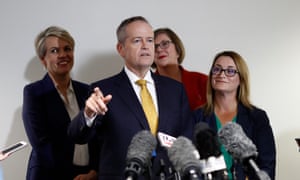Labor leader warns the businessman could turn up in Canberra with ‘a political IOU almost as big as his ego’
Bill Shorten will target Clive Palmer during his final appeal to
undecided Western Australian voters on Wednesday, declaring the
controversial businessman will turn up in Canberra with “a political IOU
almost as big as his ego” if voters lodge a protest vote with the United Australia party on 18 May.
As the campaign accelerates in the final week, Shorten will hit the hustings in Perth, visiting three seats, a visit trailing Scott Morrison, who made a brief final appeal to voters in the west at the start of the week.
In a speech on Wednesday, Shorten will ask voters to do what they did at the last state election – “reject the Liberal-One Nation alliance and choose a responsible, reforming Labor government”.
With Labor strategists concerned Palmer’s insurgency, bankrolled by saturation advertising, is disrupting Labor’s efforts to court swinging voters as polling day looms, and depressing the party’s primary vote, Shorten will attack the businessman’s corporate record, declaring “it’s not just workers who suffer when dodgy employers run and hide from paying their entitlements”.
“When people like Clive Palmer
play fast and loose with the rules – and the truth – he’s insulting all
the workers to whom he owes money,” Shorten will say. “He’s insulting
all the Australian taxpayers who are effectively subsidising his
billboards and text messages and his endless, baseless TV ads, and he’s
also laughing at all the businesses who do the right thing by their
employees.As the campaign accelerates in the final week, Shorten will hit the hustings in Perth, visiting three seats, a visit trailing Scott Morrison, who made a brief final appeal to voters in the west at the start of the week.
In a speech on Wednesday, Shorten will ask voters to do what they did at the last state election – “reject the Liberal-One Nation alliance and choose a responsible, reforming Labor government”.
With Labor strategists concerned Palmer’s insurgency, bankrolled by saturation advertising, is disrupting Labor’s efforts to court swinging voters as polling day looms, and depressing the party’s primary vote, Shorten will attack the businessman’s corporate record, declaring “it’s not just workers who suffer when dodgy employers run and hide from paying their entitlements”.
“This is just one of many reasons Australia cannot afford three years of Clive Palmer calling the shots in a Morrison government.”
Labor’s television advertising, on high rotation before the pre-poll blackout, is targeting Palmer and tying him, through the preference deal with the Liberals, to Coalition “chaos”.
A Facebook account linked to the United Australia party paid to disseminate an ad for the Queensland LNP. Questions have been raised about the overlap of the Liberals’ campaign with the UAP, with images emerging of Liberals handing out UAP campaign material, including in the marginal seat of Dunkley.
With Shorten targeting Palmer, Morrison has intensified the focus on Labor’s economic policies as the campaign hurtles to its conclusion. The Liberal leader has stepped up his attacks on Labor’s negative gearing changes, declaring the planned overhaul will depress housing prices and increase rents.
Morrison used the Liberal party’s campaign launch on Sunday to unveil a new housing policy targeted at first homebuyers, and has used the Coalition’s positive announcement as a frame to intensify negative attacks on Labor’s policy.
The Liberal leader campaigned in northern Tasmania on Tuesday and will continue his appeal in the state’s marginal seats on Wednesday morning before returning to the mainland.
Morrison is due to make a final campaign address to the National Press Club in Canberra on Thursday, and new opinion polls taking the temperature of the contest are expected later in the week.
The final dash by the leaders comes as the Australian Medical Association will on Wednesday release its assessment of the health policy announcements by the major parties during the campaign. The Guardian Essential poll indicates health is the most important issue for voters in the 2019 election, followed by national security and the economy.
The AMA president, Tony Bartone, said the offerings were a mixed bag. He said there were welcome announcements from the Coalition, Labor and the Greens, but there were also “some glaring omissions or significant underfunding in some key areas, most notably aged care, mental health, rural health, and prevention”.
“While the new funding and policies are welcome, it is disappointing that no party has set an overarching vision for the long-term future of the health system,” Bartone said. “There is no comprehensive and coordinated plan to combat the rising prevalence of chronic disease and address the complex health needs of the significantly increasing and ageing Australian population.
“There is no vision that articulates coordination, collaboration, and efficiency across the whole health system.
“There is no real acknowledgement of the importance of properly funding preventive health measures, and both the major parties have only just started to properly resource and empower general practice-led primary care.”

No comments:
Post a Comment